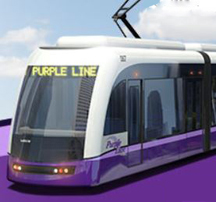Letter on WMATA Governance from the Transit First Coalition to Public Officials
January 12, 2011
As you know, two important interest groups have recently issued recommendations on improving the governance of Metro. Both the Greater Washington Board of Trade (working with the Council of Governments) and the Riders Advisory Council have made valuable contributions to public discussion of this important question. The implementation plan issued last week by the three transportation departments continues to advance the debate.
Transit First believes that any changes in the structure of WMATA must move in the direction of more democracy. Metro's current problems are in large part traceable to insufficient public control of transportation budgets. Voters believe strongly that transit should get priority in spending tax money – according to last April's Washington Post poll, by a majority of 2 to 1. Transit ridership is increasing nation-wide while the use of highways (measured in vehicle miles traveled) has stagnated since 2004.
Yet government spending priorities do not reflect the will of the people. Metro's maintenance needs are not fully funded, as billions of dollars are poured into new highways. The newly proposed WMATA capital budget eliminates needed increases in the railcar fleet, guaranteeing that severe overcrowding will soon limit ridership and create new safety hazards. And transit riders are paying more, while automobiles are increasingly subsidized. Metro's fares have gone up repeatedly, while the user fee paid by drivers (the excess of the gasoline tax over the sales tax paid on other purchases) is much smaller than it was 15 years ago.
In this light, we are concerned that the implementation plan is too narrowly focused. It fails to address the central objective of making WMATA's governance more accountable to its riders and the public. The first page of the Implementation Plan cites a need for Metro's board to be independent of political interference, yet its specific recommendations could make the board more dependent on appointing authorities. The way to insulate board members from outside interference is to make them more directly responsible to the electorate.
The Implementation Plan's treatment of Metro's safety problems is similarly narrow. It states that “WMATA must ensure the safety, security and reliability of its services.” It is of equal – indeed greater – importance for WMATA to ensure the adequacy of its services. Notwithstanding its very real current problems, Metrorail remains far safer than our highways. Failure to provide capacity to match increasing demand will degrade the safety of our transportation system by unnecessarily forcing commuters onto the dangerous highways.
All of these questions need to be openly debated by elected officials and the public. The RAC and BOT reports and the Implementation Plan are excellent starting points for this discussion. But the debate is just beginning and there has been little public input to date. Moreover, a major turnover in the WMATA board is forthcoming, along with a new General Manager.
We strongly endorse the Implementation Plan's recommendation that the WMATA compact should be amended only when there is a consensus among all stakeholders. The system's riders are the most important stakeholders of all, and the next step in improving Metro's governance must be the widest possible involvement of the public.
Members of the Transit First Coalition: Action Committee for Transit, Alexandria Transit Riders Alliance, Amalgamated Transit Union Local 689, Arlington Coalition for Sensible Transportation, Audubon Naturalist Society, CASA de Maryland, Clean Water Action, Coalition for Smarter Growth, Crofton First, DC Night Riders, Greater Greater Washington, MCGEO—UFCW Local 1994, Prince George's Advocates for Community-based Transit, Progressive Maryland, Save Maryland Area Rail Transit, Transit Riders United of Greenbelt

